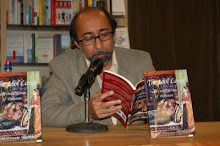I grew up knowing that I was given a different name when I was born. That name was soon changed to the name I have grown up with, my mother told me, on my grandfather's request. I wasn't particularly fond of either one, but grew to like them for both have interesting sounds. My birth name, Zaheer, easier on the tongue, carries a gentler ring. Moazzam, on the other hand, is tricky, the full extent of which I only discovered when I moved to the US and many had fun with it.
I was much older when I learned that my birth name initially belonged to a son, from an earlier marriage, my mother had lost, when he was one year old or younger. I have been very close to my half-sisters, but the mention of their brother never came up and it was almost as if he never existed. To make matters more complex, my mother also lost a daughter, Mushtri, who she occasionally called to remembrance. Having lost a few children, I retrospectively understand now why my mother worried about my safety. It is plausible that my mother choose the name without my father fully knowing the reason.
It was towards the last few years of her life, just before dementia struck her, did she openly mentioned Zaheer's presence, with or without mentioning his name. Often, it seemed, she was talking to herself. But, then, one time she pointed up and informed me that he'd been up there beckoning her.
It was decided, considering her mental state, she'd be better taken care of in Lahore by her daughters, nieces and nephews, and grandchildren, not to mention neighbors - because of the culture's overall intrinsic kindness towards elders. She finally left us to be with her dead children a couple of years later. My short story Cafe Le Whore was an exercise in comprehending my loss of her.
She left me with a few piles of her papers saved in a couple of plastic bags consisting of letters (mine and from others), receipts, addresses, postcards, invitation cards, brochures and newspaper cuttings about the plays she had acted in - and photographs, many of which I'd seen before, but not all, wondering if she had kept a few of them hidden. Or perhaps, despite being very attracted to the stories photographs tell us, I might not have paid attention to those which now suddenly drew my attention. One of the pictures among those, black and white, faded and crumpled in places, is that of Zaheer. I have a habit of going through her photographs as a hobby and I look at Zaheer's occasionally, not because I feel jealousy or a deep connection with him, nor does his face remind me of my mother. I can remember her based on my own memories! I look at his face to feel my mother's sense of loss and grief she must have carried in her head and her hazel eyes all those years. Is that even possible?
A dear friend of mine, a fine writer based in Bombay, lost a sister in an automobile accident a few days ago. And his mother a daughter. My eyes have been flitting from his face to hers, though they are thousands of miles away, while I try to understand the desire in us to map the loss and grief etched or hidden on the faces of others. My mother's face, always busy with the worries of day to day survival, didn't allow me a peek at her camouflaged pain numbed with the passage of time. She also witnessed partition; yet it is not my place to guess if a callosal collective tragedy can lessen the impact of personal suffering.
When my cousin and one of my dearest friends - we were only 6 months apart - fell victim to a robber's bullet in Lahore, I learned that my close American friends lacked the means and culture to grieve with me for one reason or another. I don't hold it against them, but I keep on trying to fathom the DNA of that posture. Not a day goes by when I don't think of him. Losing him became a very private feeling.
Perhaps the toughest day of my professional life as a librarian occurred a week ago when a woman around thirty sought help securing two books, one on bi-polar disorder, the other on PTSD. As I pulled out those books off the shelf, she whispered she needed help with another book. After a pause, barely audible, she managed, On child loss. Thrown off, I asked, mostly to find my own balance, if she meant miscarriage, disappearance or abduction. She said, her eyes downcast, No, as in loss of a child. I remember mumbling, That's heavy. We walked back to the reference desk to do research. I found her a title that dealt with healing and trauma, containing a chapter on losing a child. She thanked me again. I don't know if I did right or wrong by asking. Are you trying to help a friend or something personal? Personal, she replied. Murdered! I inhaled, then told her how sorry I was to hear that and I hoped that she'd find the strength to deal with her loss and grief. She heard me and said thank you again before she turned away. I suppressed the urge to tell her about my mother and the children she'd lost as if another person's loss could lighten one's grief. I wanted to tell her about my cousin and about my writer friend and his mother and many other tragedies that have ricocheted me. Perhaps I wanted to say that one person's grief belongs to others too and must be shared.

